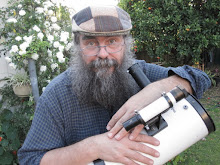Wednesday, March 11, 2009
Occam's Razor and the Two World Systems
Over at my blogging buddy ERV's place, there's a lot of arguing going on [1], which at one stage segued into a silly argument about Occam's Razor and the Heliocentric vs Geocentric theories (See William Wallace's post and subsequent posts, and William Wallace's own webpost on this topic).
First off, Occam's razor is not "Choose the simplest explanation". Occam said entia non sunt multiplicanda praeter necessitatem, which can be translated as "entities must not be multiplied beyond necessity"[2]. These days, in science we understand Occam's razor as (quoting Wikipedia)
As well, you need to understand that in describing cosmological systems, the preference from antiquity to Galileo was to explain heavenly motions in terms of uniform, circular motions. We may see this as weird or foolish now, but it wasn't back then. Now, on to William Wallace.
A little explanation. If the Earth is the centre of the universe, with the planets and fixed stars revolving around it with uniform circular motions, you should see the all the planets move smoothly across the sky at the same pace and the same brightness. But they don't. The inner planets, Mercury and Venus, never move far from the Sun and change radically in brightness. The outer planets move across the sky, then stop, reverse their motion, stop again, then move back the way they were going in the first place. Any geocentric explanation has to explain this retrograde motion.
Ptolemy solved these problems. First, he had the planets not orbit the earth directly, but orbit a point that itself orbited the Earth. This is the epicycle (for an animation see here). Mercury and Venus required somewhat more complicated solutions (see here for an animation of Mercruy in a geocentric system) than for the outer planets. Even so, this system still didn't quite work. Ptolemy also introduced the equant, the planets did not in fact orbit the Earth, but orbited a point some distance away from the Earth. It worked, and the Ptolemaic geocentric system was the standard description of the Solar system until the time of Copernicus. Copernicus, of course, moved the centre of the universe to the Sun, and had all the planets, including Earth, revolve around that.
Now, in terms of Occam's razor, Copernicus's heliocentric system should have been an outright winner. Both the Ptolemaic system and the Copernican system explained retrograde orbits and the reason Venus and Mercury never travelled far from the Sun, but the Copernican system got rid of the ad hoc large epicycles, the retrograde motions of the planets were natural results of the planets orbiting the Sun, as was the explanation of Venus and Mercury not moving far from the Sun, as they orbited inward of the Earth. Most importantly, the ad hoc equant was removed. In the time of Copernicus, getting rid of the equant was more important than many other innovations, as the equant represented a departure from the ideal of explaining the solar system using uniform, circular motion.
The Copernican system also explained things the the Ptolemaic system didn't. It gave a natural explanation for the ordering of the orbits of the planets, it also explained the precession of the equinoxes and the seasons. So, not only did the Copernican system explain the same facts as the Ptolemaic system with fewer ad hoc assumptions, it had greater explanatory power. It did require the assumption that the Fixed stars were very far away, but that was no more ad hoc than the Ptolemaic assumption that they were relatively near. So, in the Occam's razor stakes, it should have won hands down, and indeed the Copernican system was popular with northern European astronomers. Southern European, not so much.
So, along comes Tycho Brahe, he makes the most accurate observations of the stars and planets ever and he ....
Rejects the Ptolemaic system. He makes a system where all the planets bar Earth orbit the Sun (animation here) and the Sun with its panalopy of planets orbits the Earth. It's a kludge, an obvious kludge. The orbits of Mars and the Sun intersected for criminies sake! In terms of Occam's razor, Tycho's helio-geocentric system fails, introducing unwarranted assumptions. The parallax issues was a problem, but again, if the fixed stars were far away (as they were), then parallax would not be observable.
The observations of the phases of Venus by Galileo, and of the Moons of Jupiter meant that the Ptolemaic system (which Tycho rejected) was wrong. Interestingly, Galileo observed changes in the timing of the eclipses of the Moons of Jupiter that could be accounted for only by the parallax changes due to an orbiting Earth, but didn't realise it. In 1613 the annually periodic seasonal variations of sunspot trajectories across the sun's disc was discovered. This fitted with the hypothesis of a rotating earth, and not one of an orbiting Sun. Then in 1729 James Bradley discovered stellar aberration, which can be only explained by a rotating, orbiting Earth. Finally in 1838 , Friedrich Bessel made the first successful measurements of stellar parallax.
Tycho did not accept the Copernican system, but neither did he accept the geocentric Ptolemaic system. His rejection of the Copernican system in favour of a more complicated system of his own devising was a failure of Tycho, not of Occam's razor. Indeed, the Earth does rotate around the Sun, and choosing Occam's razor would have given us the right result (As Tycho's system made more unwarranted assumptions than the Copernican system - Stars close to earth, two centres of rotation and crossing orbits).
[1] Well, it's basically over now, that's what I get by being distracted by the sky. But I have a point I want to make.
[2] He also said Pluralitas non est ponenda sine necessitate which translates as "plurality should not be posited without necessity."
First off, Occam's razor is not "Choose the simplest explanation". Occam said entia non sunt multiplicanda praeter necessitatem, which can be translated as "entities must not be multiplied beyond necessity"[2]. These days, in science we understand Occam's razor as (quoting Wikipedia)
When multiple competing hypotheses are equal in other respects, the principle recommends selecting the hypothesis that introduces the fewest assumptions and postulates the fewest entities.
As well, you need to understand that in describing cosmological systems, the preference from antiquity to Galileo was to explain heavenly motions in terms of uniform, circular motions. We may see this as weird or foolish now, but it wasn't back then. Now, on to William Wallace.
I have a counter example, from science, fully described here, where Occam's razor fails. The idea that the "simplest explanation is probably right" was falsified when Tycho Bryhe [sic] rejected heliocentricism for geocentricism, based on his analysis of the best available data.Okay, there are several things wrong with this. One: Occam's razor isn't "simplest explanation is probably right" (see above). Secondly, Tycho Brahe didn't reject heliocentrism for geocentricism.
A little explanation. If the Earth is the centre of the universe, with the planets and fixed stars revolving around it with uniform circular motions, you should see the all the planets move smoothly across the sky at the same pace and the same brightness. But they don't. The inner planets, Mercury and Venus, never move far from the Sun and change radically in brightness. The outer planets move across the sky, then stop, reverse their motion, stop again, then move back the way they were going in the first place. Any geocentric explanation has to explain this retrograde motion.
Ptolemy solved these problems. First, he had the planets not orbit the earth directly, but orbit a point that itself orbited the Earth. This is the epicycle (for an animation see here). Mercury and Venus required somewhat more complicated solutions (see here for an animation of Mercruy in a geocentric system) than for the outer planets. Even so, this system still didn't quite work. Ptolemy also introduced the equant, the planets did not in fact orbit the Earth, but orbited a point some distance away from the Earth. It worked, and the Ptolemaic geocentric system was the standard description of the Solar system until the time of Copernicus. Copernicus, of course, moved the centre of the universe to the Sun, and had all the planets, including Earth, revolve around that.
Now, in terms of Occam's razor, Copernicus's heliocentric system should have been an outright winner. Both the Ptolemaic system and the Copernican system explained retrograde orbits and the reason Venus and Mercury never travelled far from the Sun, but the Copernican system got rid of the ad hoc large epicycles, the retrograde motions of the planets were natural results of the planets orbiting the Sun, as was the explanation of Venus and Mercury not moving far from the Sun, as they orbited inward of the Earth. Most importantly, the ad hoc equant was removed. In the time of Copernicus, getting rid of the equant was more important than many other innovations, as the equant represented a departure from the ideal of explaining the solar system using uniform, circular motion.
The Copernican system also explained things the the Ptolemaic system didn't. It gave a natural explanation for the ordering of the orbits of the planets, it also explained the precession of the equinoxes and the seasons. So, not only did the Copernican system explain the same facts as the Ptolemaic system with fewer ad hoc assumptions, it had greater explanatory power. It did require the assumption that the Fixed stars were very far away, but that was no more ad hoc than the Ptolemaic assumption that they were relatively near. So, in the Occam's razor stakes, it should have won hands down, and indeed the Copernican system was popular with northern European astronomers. Southern European, not so much.
So, along comes Tycho Brahe, he makes the most accurate observations of the stars and planets ever and he ....
Rejects the Ptolemaic system. He makes a system where all the planets bar Earth orbit the Sun (animation here) and the Sun with its panalopy of planets orbits the Earth. It's a kludge, an obvious kludge. The orbits of Mars and the Sun intersected for criminies sake! In terms of Occam's razor, Tycho's helio-geocentric system fails, introducing unwarranted assumptions. The parallax issues was a problem, but again, if the fixed stars were far away (as they were), then parallax would not be observable.
The observations of the phases of Venus by Galileo, and of the Moons of Jupiter meant that the Ptolemaic system (which Tycho rejected) was wrong. Interestingly, Galileo observed changes in the timing of the eclipses of the Moons of Jupiter that could be accounted for only by the parallax changes due to an orbiting Earth, but didn't realise it. In 1613 the annually periodic seasonal variations of sunspot trajectories across the sun's disc was discovered. This fitted with the hypothesis of a rotating earth, and not one of an orbiting Sun. Then in 1729 James Bradley discovered stellar aberration, which can be only explained by a rotating, orbiting Earth. Finally in 1838 , Friedrich Bessel made the first successful measurements of stellar parallax.
Tycho did not accept the Copernican system, but neither did he accept the geocentric Ptolemaic system. His rejection of the Copernican system in favour of a more complicated system of his own devising was a failure of Tycho, not of Occam's razor. Indeed, the Earth does rotate around the Sun, and choosing Occam's razor would have given us the right result (As Tycho's system made more unwarranted assumptions than the Copernican system - Stars close to earth, two centres of rotation and crossing orbits).
[1] Well, it's basically over now, that's what I get by being distracted by the sky. But I have a point I want to make.
[2] He also said Pluralitas non est ponenda sine necessitate which translates as "plurality should not be posited without necessity."
Labels: Copernicus, creationism, Galileo
Comments:
<< Home
Thanks for the animation links. The one on Tycho's version of geocentricism is very useful as an educational tool.
"So, not only did the Copernican system explain the same facts as the Ptolemaic system with fewer ad hoc assumptions, it had greater explanatory power."
And yet Copernicus' model defied experimental verification, using the best astronomical apparatus of the time (Tycho's).
"Now, in terms of Occam's razor, Copernicus's heliocentric system should have been an outright winner. Both the Ptolemaic system and the Copernican system explained retrograde orbits and the reason Venus and Mercury never traveled far from the Sun"
There were three systems, Copernicus, classical Ptolemaic, and neo-Ptolemaic (or Tycho's). Both Ptolemy's and Tycho's could be accurately described as geocentricism. I just want to clarify that I don't think I ever claimed--and I certainly never intended to claim--that Tycho held a purely Ptolemaic view of the solar system. He held a geocentric view, more consistent with Ptolemy's than Copernicus's (though Kepler's was arguably more akin to Copernicus's than Tycho's was to Ptolemy's.)
"The Copernican system also explained things the the Ptolemaic system didn't."
And yet it defied experimental verification: "Any attempt to test Copernicus’s theory in the sixteenth century was doomed to failure, and in fact failed.–Steven L. Goldman
Backing up one on the quote stack...your elevation of the worth of an elegant explanations hearkens back to the Greeks, who, from what I understand, didn't much bother fact checking their scientific theories since they had so much self-evident explanatory power.
You continue...
"The observations of the phases of Venus by Galileo, and of the Moons of Jupiter meant that the Ptolemaic system (which Tycho rejected) was wrong."
Yes, with the invention of the perspicillum in the early 17th century, the balance of evidence began to tilt toward Kepler's theories (which was elliptical orbits with non-uniform speeds). Or did Galileo's observations you describe pre-date 1601, the year of Tycho's mysterious death?
"His rejection of the Copernican system in favour of a more complicated system of his own devising was a failure of Tycho, not of Occam's razor."
I am unaware if Tycho ever explicitly cited William of Ockham's rule of thumb, but I am still failing to see how Tycho deviated from it in principle. Tycho did not have access, as far as I know, to Galileo's or Bessel's observations--Tycho having died before they were performed and disseminated.
Tycho's system required fewer calculations and was consistent with all known measurements. Copernicus's was not consistent with observations. From what I understand, Kepler tried and failed to persuade Tycho of the probably correctness of Copernicus's theories.
What argument, assuming he did not have a time travel device, did Copernicus fail to make? What data did Tycho intentionally ignore? You're not accusing the pre- emanate observational astronomer of the time of being incompetent, are you?
My ultimate point about Tycho's rejection of Copernican theory was that applying principles of modern science sometimes leads one astray.
"So, not only did the Copernican system explain the same facts as the Ptolemaic system with fewer ad hoc assumptions, it had greater explanatory power."
And yet Copernicus' model defied experimental verification, using the best astronomical apparatus of the time (Tycho's).
"Now, in terms of Occam's razor, Copernicus's heliocentric system should have been an outright winner. Both the Ptolemaic system and the Copernican system explained retrograde orbits and the reason Venus and Mercury never traveled far from the Sun"
There were three systems, Copernicus, classical Ptolemaic, and neo-Ptolemaic (or Tycho's). Both Ptolemy's and Tycho's could be accurately described as geocentricism. I just want to clarify that I don't think I ever claimed--and I certainly never intended to claim--that Tycho held a purely Ptolemaic view of the solar system. He held a geocentric view, more consistent with Ptolemy's than Copernicus's (though Kepler's was arguably more akin to Copernicus's than Tycho's was to Ptolemy's.)
"The Copernican system also explained things the the Ptolemaic system didn't."
And yet it defied experimental verification: "Any attempt to test Copernicus’s theory in the sixteenth century was doomed to failure, and in fact failed.–Steven L. Goldman
Backing up one on the quote stack...your elevation of the worth of an elegant explanations hearkens back to the Greeks, who, from what I understand, didn't much bother fact checking their scientific theories since they had so much self-evident explanatory power.
You continue...
"The observations of the phases of Venus by Galileo, and of the Moons of Jupiter meant that the Ptolemaic system (which Tycho rejected) was wrong."
Yes, with the invention of the perspicillum in the early 17th century, the balance of evidence began to tilt toward Kepler's theories (which was elliptical orbits with non-uniform speeds). Or did Galileo's observations you describe pre-date 1601, the year of Tycho's mysterious death?
"His rejection of the Copernican system in favour of a more complicated system of his own devising was a failure of Tycho, not of Occam's razor."
I am unaware if Tycho ever explicitly cited William of Ockham's rule of thumb, but I am still failing to see how Tycho deviated from it in principle. Tycho did not have access, as far as I know, to Galileo's or Bessel's observations--Tycho having died before they were performed and disseminated.
Tycho's system required fewer calculations and was consistent with all known measurements. Copernicus's was not consistent with observations. From what I understand, Kepler tried and failed to persuade Tycho of the probably correctness of Copernicus's theories.
What argument, assuming he did not have a time travel device, did Copernicus fail to make? What data did Tycho intentionally ignore? You're not accusing the pre- emanate observational astronomer of the time of being incompetent, are you?
My ultimate point about Tycho's rejection of Copernican theory was that applying principles of modern science sometimes leads one astray.
There is so much wrong here, it will take some time to deal with it, an I am rather busy this weekend, so it may be a day or so before I get back to this.
You may not have noticed, but I'm busy. In between work and family commitments and trying to keep people notified of IYA events, I don't really have time for much else. I will get back to this when I have enough time to sit down and type for a while.
My apologies. I don't have access to your calender. I was wondering because previously you wrote "so it may be a day or so before I get back to this." I trust you understand the source of my confusion.
My diary has been a solid block of red and green with lectures, meetings and lab work. In my "me" time, in addition to alerting people to small near earth asteroids and not finding L4 asteroids, in the background I've also been doing things I didn't expect to do, like taking EldestOne to High School opendays at a couple of hours notice, organising lab visits for out of state researchers and judging abstracts for travel grants. I've been busy. I've also been doing this.
That said, the copy of "Dialogue on the Two Chief World Systems" that I ordered has come in, so now is as good a time as any to revistsit this, so long as I an not distract- "Ohhh! Shiny!"
That said, the copy of "Dialogue on the Two Chief World Systems" that I ordered has come in, so now is as good a time as any to revistsit this, so long as I an not distract- "Ohhh! Shiny!"
Yet years later I still don't get to find out what Ian Musgrave, aka "Mister Busy," had to say about your posting. I'm always fascinated by folks who say--repeatedly--that they are too busy to say anything until some future time, and in fact go into detail about being busy in trying to explain why they don't have time to go into detail about what they will say in that future time. Oh well, in the meantime, here's something to consider, from those who have another perspective on that whole heliocentric theory thingie.
www.staticearth.net
www.staticearth.net
If Ian Musgrave aka 'Mr Busy' would like to comment of equants in the heliocentric model I would be grateful indeed as the centre of gravity of orbs rarely corresponds to the geographical volumnal centre.
Post a Comment
<< Home





 Click to read about or order
Click to read about or order Click to read about or order
Click to read about or order Click to read about or order
Click to read about or order Click to read about or order
Click to read about or order




